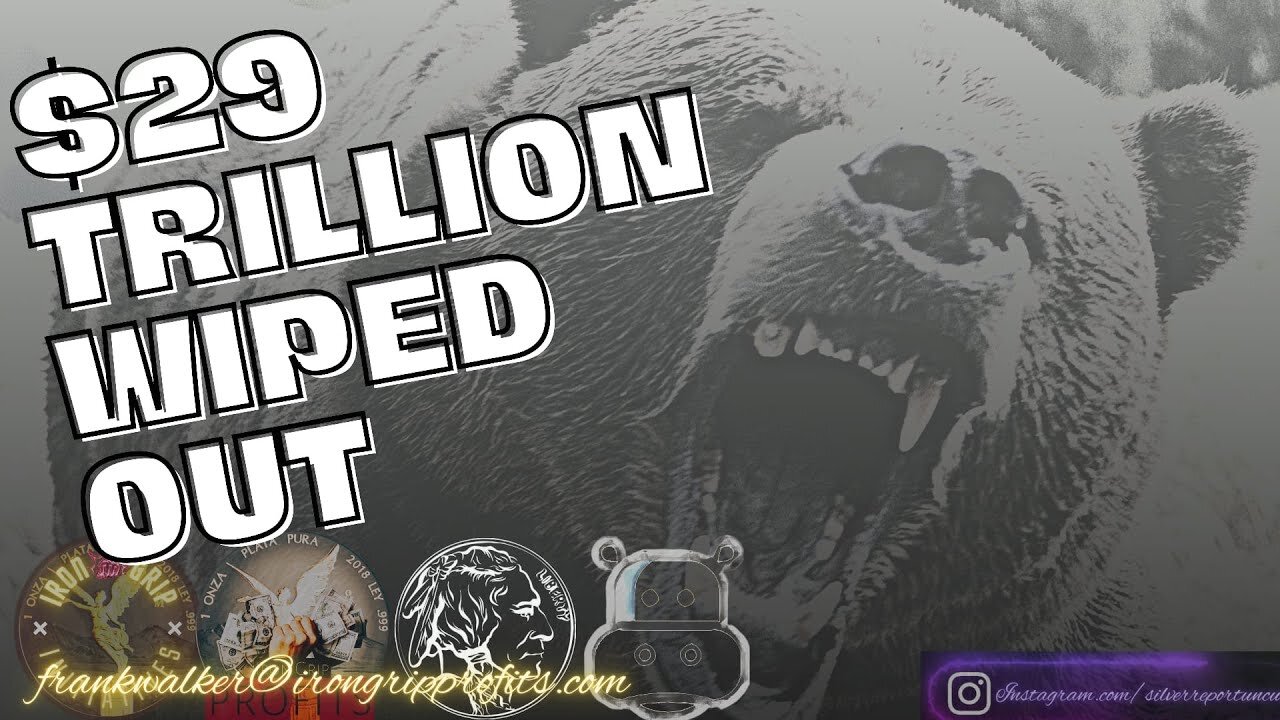Premium Only Content

$29 Trillion Stripped From World Economy! How Much Has The Fed Monetary A$$ault Cost The US & World
The MSCI World index has dropped $29 trillion since its peak in November Please Support our operation. You can use Cashapp here is the cashtag $silverreport you will use to lend support to our employees, The SRU's survival and growth and my family, thank you for all you've done, cashapp and PayPal arrives instantly just like crypto which I can immediately access. http://buymeacoffee.com/silverreport
send support via paypal silverreportuncut@gmail.com
or cash app
follow us on Instagram
http://Instagram/silverreportuncut
for everything sales subscribe to
http://youtube.com/c/irongripprofits
subscribe today https://rumble.com/c/SilverReportUncut
check out new episodes on the original Silver Report
http://youtube.com/c/silverreport
Follow every creature ministry
http://youtube.com/c/everycreaturemin...
get paid to watch this SRU channel
http://bit.ly/odyseesru
Telegram http://t.me/silverreport
Support via Bitcoin,
BTC only at this address! bc1quwa5rcfjmy2cp868mphtrz6nd80g3w659ekgyl
contact us for more options here https://wa.me/message/LBCYLUQBZKR4A1
How much has the Fed's epic "inflationary is transitory" policy error cost the world? Try $29 trillion and counting.
According to calculations from Bloomberg's Robert Fullem, the combined market value of the Bloomberg Global Aggregate bond index and the MSCI World index has dropped $29 trillion since its peak in November 2021. The price gauge of the former has dropped to its lowest level since 2011. That is more than twice the level of the world’s international reserves assets, currently at about $12 trillion.
As Fullem notes, the drop in asset prices may not just be about inflation or rising rates but also about the prospect of a perpetual debt spiral to fuel a modicum of growth. Central-bank rate hikes and balance sheet trimming is making future debt more expensive. In some cases, debt costs rise further amid a dearth of foreign buyers as investors stick to local markets and official accounts see reserve balances shrink. In other cases, a high absolute levels of debt and changing political landscape triggers repayment angst. Additionally, "shifting trade balances and protectionism complicates the issue as it threatens to shrink the world’s production capacity and potentially turn Bernanke’s global savings glut into a shortage."
Of course, the risk for central banks is that, as growth slows - and it will sharply and very soon - they will be forced to capitulate on tightening amid political concerns or domestic outrage, just as we have been warning for the past year. As a result, inflation worries will also resurface. Some of these issues may be impacting the pound and gilts, in unison.
-
 9:08
9:08
SRU
2 years ago $0.35 earnedSilver at the End of Petro Dollar
1.79K6 -
 0:47
0:47
Reuters Innovation
3 years agoFrog and snake species cost world economy $16 billion
28K93 -
 0:35
0:35
Sales NFT - Vendas NFT
3 years agoNFT World Economy / SALES NFT VENDAS
47 -
 2:32:19
2:32:19
megimu32
6 hours agoOTS: From Star Search to Superstardom
41.5K4 -
 1:56:21
1:56:21
Joker Effect
5 hours agoInterviewing GREENMAN! Looks like he is coming to Rumble! Let's give him a warm welcome! REAL TALENT
25.6K1 -
 1:07:21
1:07:21
Anthony Rogers
12 hours agoEpisode 380 - Is Pain All In Your Head?
18K3 -
 1:46:17
1:46:17
Glenn Greenwald
10 hours agoGlenn Takes Your Questions on Censorship, Epstein, and More; DNC Rejects Embargo of Weapons to Israel with Journalist Dave Weigel | SYSTEM UPDATE #505
119K8 -
 3:26:34
3:26:34
Jokeuhl Gaming and Chat
11 hours agoHelldivers 2 - Spreading Democracy w/ Ryker
14K1 -
 27:47
27:47
Stephen Gardner
7 hours ago🚨BREAKING: Trump FURIOUS Over Kamala’s Latest Move – SHOCKING Details!
19.5K83 -
 8:00:13
8:00:13
Dr Disrespect
15 hours ago🔴LIVE - DR DISRESPECT - GEARS RELOADED GLOBAL LAUNCH - CRUSHING LOCUST
115K14